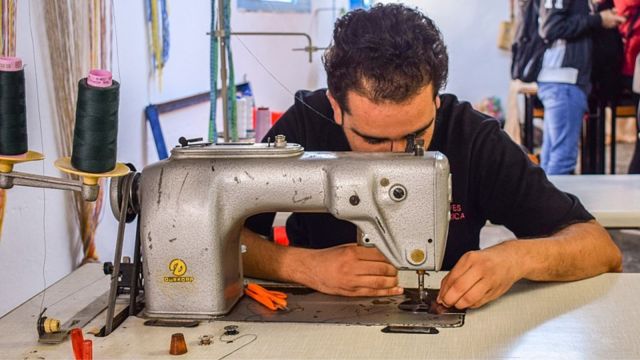
In a meeting held on October 28, the Uttar Pradesh State Women Commission proposed measures to protect women from “bad touch”. The proposal stated, among other things, that only female tailors should take measurements for stitched clothes worn by women and that CCTVs should be installed in tailoring shops. A report by this newspaper also quoted Himani Agarwal, a member of the women’s body, saying, “We have also said that in salons, it should only be female barbers who should attend to female customers… We are of the view that because of men involved in this type of profession, women are molested. They (men) try to indulge in bad touch,” Agarwal added. She said that this is just a proposal as of now and the women’s commission will subsequently request the state government to make laws regarding this.
A tailor or darzi or masterji, as they are called, with a pedal-operated sewing machine can be found in every marketplace, in corridors and often outside cloth shops and dry cleaners. Most of the darzis specialise in women’s clothing and each one has special skills — some may be masters at copying the latest designs and others, at stitching sari blouses. Bespoke clothing, especially for sari blouses, was a necessity at a time when ready-made options were not always available.
Tailors today are already in danger of losing their clientele to the trendy online (and brick-and-mortar shops) with their ready-to-wear clothing. The men working in these professions predominantly belong to lower economic classes and castes. Sain, for instance, is a generic term for occupational castes of barbers — nai — and is classified as OBC (Other Backward Class) while many local tailors are Muslim.
Most darzis are self-employed or work in small boutiques/shops and are aware that anything untoward will impact their earnings and livelihoods. The same goes for men working in salons. Earlier, there were barber shops for men and the salons for women were largely staffed with women. This slowly changed with liberalisation in India leading to the rise of unisex hair and beauty salons across the country. One of the first such chains was by the well-known hairstylist Jawed Habib called Habibs. The larger cities experienced these changes first and smaller towns and cities have slowly caught on. With a greater number of financially independent women and increasing disposable incomes, women began to venture out far more, including visiting salons. The concept of unisex salons also caught on, with considerable overlap in services accessed by both men and women.
Salons often have open floor plans so that there is little chance of any untoward incident and staff are always under the scrutiny of management. The more intimate work, such as waxing and hair removal, is almost always done in cubicles by women. CCTVs in such spaces would violate privacy. Therefore, here, technology and segregation are not the answer.
The idea of “bad touch” has come from teaching children about being vigilant and aware of appropriate/inappropriate adult behaviour. To use this as a reason for further policing both infantilises women and seemingly takes us back to the idea of zenanas.
Additionally, as numerous studies have shown, women are most at risk of violence and sexual assault within their own homes, at the hands of their husbands, relatives or family friends. It is a well-established fact that India is unsafe for women. But the idea that the state must be seen to be proactive in preventing sexual harassment and assault does not mean that it should create straw men and stigmatise certain professions.
What is needed is a change in societal attitudes rather than more segregation, which comes with its own set of problems. It is rooted in the idea that men and women cannot mix socially, that women belong to their families, and that the family’s honour resides in them and their bodies.
Today, we have perhaps become so inured to such pronouncements that this proposal doesn’t make much of a difference. We already live in a very segregated society — be it in terms of gender, caste, class etc. But there are larger numbers of women out in public spaces today. Laws that further enforce segregation and technological surveillance will not ensure that women are not assaulted or harassed — what is needed instead is a change of attitude and far more intermingling between the sexes.
The writer worked in the development sector